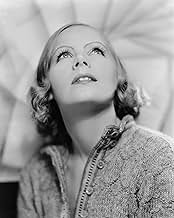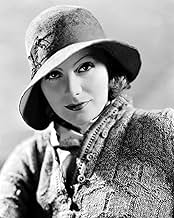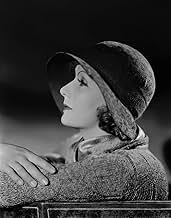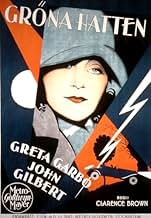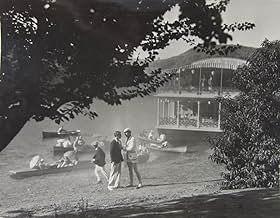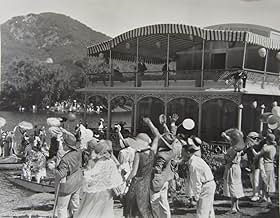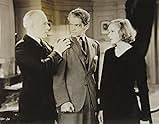CALIFICACIÓN DE IMDb
7.1/10
1.8 k
TU CALIFICACIÓN
Cuando a dos novios de la infancia se les impide casarse, sobreviene la desdicha.Cuando a dos novios de la infancia se les impide casarse, sobreviene la desdicha.Cuando a dos novios de la infancia se les impide casarse, sobreviene la desdicha.
- Dirección
- Guionistas
- Elenco
- Nominado a 1 premio Óscar
- 2 premios ganados y 1 nominación en total
Johnny Mack Brown
- David Furness
- (as John Mack Brown)
Gertrude Astor
- Party Guest
- (sin créditos)
Agostino Borgato
- French Police Inspector
- (sin créditos)
F.F. Guenste
- Servant at Davids Death Investigation
- (sin créditos)
Sydney Jarvis
- Gendarme
- (sin créditos)
Fred Kelsey
- Detective
- (sin créditos)
Anita Louise
- Diana - as a Child
- (sin créditos)
Alphonse Martell
- French Hotel Concierge
- (sin créditos)
William H. O'Brien
- Man Peering Into Room
- (sin créditos)
Frank Finch Smiles
- Butler
- (sin créditos)
Opiniones destacadas
Greta garbo's career spanned the 1920s (silents) and 1930s (talkies). This one came about halfway through, just before the switch to talkies. And because it's a silent, you are forced to really pay attention. Featuring garbo and gilbert, the huge stars of the day. Co-stars a couple more big names.. doug fairbanks and lewis stone. Diana and neville want to be married, but his father wants to prevent it from happening. High drama, in spite of the fact that it's been toned way down from the original story. This started life as a novel, then a play, and later this film! According to the trivia section, because the original story had so many taboo elements, it was all changed around to get past the censors. Interesting, since so many of the production code rules didn't really get enforced until the early 1930s. It's a good film, in spite of all the changes. It was even nominated for best writing. And that's an accomplishment, since the story had been so altered. Directed by clarence brown. And pretty amazing picture quality, since this is coming up on 100 years old. Must have been a good restoration. Never miss a greta garbo film!
A WOMAN OF AFFAIRS (MGM, 1928), directed by Clarence Brown, from the then controversial novel, "The Green Hat" by Michael Arlen, reunites then popular love team of John Gilbert and Greta Garbo in their third collaboration on screen. Initially teamed under Clarence Brown's direction in the highly popular FLESH AND THE DEVIL (1926), followed by LOVE (1927), taken from the Leo Tolstoy's classic novel, "Anna Karenina," Gilbert and Garbo once more star in a silent melodrama about love and tragedy. Unlike their earlier screen efforts, their characters in this story are already acquainted since childhood, leaving no chance of meeting and falling in love, but the difference here is that their relationship is interfered by a third party who happens not to be another lover or spouse. And unlike their earlier two films, Garbo is more the central focus here than Gilbert.
The story begins quite amusingly, finding the wild and merry Diana Merrick (Greta Garbo) driving recklessly down the road in the Mack Sennett Keystone comedy fashion, nearly missing the ditch diggers as she drives over them. Moments later, the characters in the story, the Holderness and the Merricks, are introduced with each passing scene. Diane is a carefree woman who has loved Neville Holderness (John Gilbert) since childhood. She has a brother, Jeffry (Douglas Fairbanks Jr.), a pampered youth who's so bored with his life that his only satisfaction is boozing up with liquor. Jeffry's closest friend, David Furness (Johnny Mack Brown), tries to stop him from his wild and wicked ways, but to no avail. Neville's father, Sir Morton (Hobart Bosworth), disapproves of the Merrick family's way of life. When he learns that his son wants to marry Diana, he manages to send Neville away to Egypt for a few years, in hope that the two will forget one another through the passage of time. Two years later, Diana marries David. On their wedding night, detectives (one of them played by character actor Fred Kelsey) enter their honeymoon suite in France to arrest David on the charges of theft. Before he can be arrested, David ends his life by jumping out the window. To keep David's name clear for decency sake, she secretly sets out to repay the victims of David's past crimes, a deed only known to the family physician, Doctor Hugh Trevelyan (Lewis Stone). Over the next few years, Diana makes the gossip columns as being a widow of many love affairs throughout the world. As for Neville, he becomes engaged to marry a nice young girl named Constance (Dorothy Sebastian), whom, as Diana describes through the title cards, as a girl "whose eyes are so true and clean." But Old Man Holderness, knowing how his son and Diana still feel about one other, continues to keep the scandalous Diana away his son, causing Neville to become like Jeffry, an unbearable alcoholic.
While not as famous by today's standards as FLESH AND THE DEVIL, A WOMAN OF AFFAIRS somewhat predates those "Peyton Place"-type soap-operas or Lana Turner melodramas quite popular during the 1950s and 60s. It also shows that aristocratic families may have all the luxuries that money can buy, but money does not always buy happiness. Douglas Fairbanks Jr.'s portrayal as an unhappy youth who turns to drink, is quite believable, especially when his glassy eyes, uncombed hair almost covering a portion of his eye, with whiskey glass in his hand that at times has him resemble a young John Barrymore. Whether this was intentional or not will never be known. Fairbanks, however, does well with his early screen performance.
Clarence Brown's direction with the Gilbert-Garbo loves scenes do have some bonuses, but are not as "hot" as in FLESH AND THE DEVIL. One scene that stands out is finding Diana, wearing a special ring on her finger, making love to Neville on the couch, with Diana telling him, "I would only take it off for the man I love." The camera then pans down to her hand just as the ring slowly slips off her finger. As for the story itself, it takes place during a span of ten years, yet the characters in the plot don't look any different in the conclusion as they appear in the opening, making the storyline look more as if it takes place in a span of ten months than ten years. The costumes and hairstyles are obviously modern late 1920s, which works out better in the latter portion of the story than the early segments, circa 1918. And although Garbo has that special beauty, especially when properly photographed, she doesn't look particularly attractive in some of those costumes designed for her, mainly when wearing those flapper-designed hats. Essentially a silent movie that was initially distributed in theaters with recorded scoring, one wishes such a score for this film have been used for its current video distribution, which comes with a Thames stereo orchestral soundtrack. The stereo score has its moments, but when it comes to its slow tempo violin playing in some segments of the story, it becomes a real sleep inducer. A WOMAN OF AFFAIRS was remade by MGM in 1934 as OUTCAST LADY starring Constance Bennett and Herbert Marshall. Both versions are available for viewing on cable TV's Turner Classic Movies.
One final note: A WOMAN OF AFFAIRS was one of the 13 feature films presented on the public television series, MOVIES, GREAT MOVIES (Original air date: October 26, 1973), a 50th anniversary tribute to Metro-Goldwyn-Mayer of the silent era, as hosted by Richard Schickel, on WNET, Channel 13, in New York City. Clocked then at 109 minutes, the TCM print differs in scoring and length, either at 98 (Thames) or 91 minutes. (***)
The story begins quite amusingly, finding the wild and merry Diana Merrick (Greta Garbo) driving recklessly down the road in the Mack Sennett Keystone comedy fashion, nearly missing the ditch diggers as she drives over them. Moments later, the characters in the story, the Holderness and the Merricks, are introduced with each passing scene. Diane is a carefree woman who has loved Neville Holderness (John Gilbert) since childhood. She has a brother, Jeffry (Douglas Fairbanks Jr.), a pampered youth who's so bored with his life that his only satisfaction is boozing up with liquor. Jeffry's closest friend, David Furness (Johnny Mack Brown), tries to stop him from his wild and wicked ways, but to no avail. Neville's father, Sir Morton (Hobart Bosworth), disapproves of the Merrick family's way of life. When he learns that his son wants to marry Diana, he manages to send Neville away to Egypt for a few years, in hope that the two will forget one another through the passage of time. Two years later, Diana marries David. On their wedding night, detectives (one of them played by character actor Fred Kelsey) enter their honeymoon suite in France to arrest David on the charges of theft. Before he can be arrested, David ends his life by jumping out the window. To keep David's name clear for decency sake, she secretly sets out to repay the victims of David's past crimes, a deed only known to the family physician, Doctor Hugh Trevelyan (Lewis Stone). Over the next few years, Diana makes the gossip columns as being a widow of many love affairs throughout the world. As for Neville, he becomes engaged to marry a nice young girl named Constance (Dorothy Sebastian), whom, as Diana describes through the title cards, as a girl "whose eyes are so true and clean." But Old Man Holderness, knowing how his son and Diana still feel about one other, continues to keep the scandalous Diana away his son, causing Neville to become like Jeffry, an unbearable alcoholic.
While not as famous by today's standards as FLESH AND THE DEVIL, A WOMAN OF AFFAIRS somewhat predates those "Peyton Place"-type soap-operas or Lana Turner melodramas quite popular during the 1950s and 60s. It also shows that aristocratic families may have all the luxuries that money can buy, but money does not always buy happiness. Douglas Fairbanks Jr.'s portrayal as an unhappy youth who turns to drink, is quite believable, especially when his glassy eyes, uncombed hair almost covering a portion of his eye, with whiskey glass in his hand that at times has him resemble a young John Barrymore. Whether this was intentional or not will never be known. Fairbanks, however, does well with his early screen performance.
Clarence Brown's direction with the Gilbert-Garbo loves scenes do have some bonuses, but are not as "hot" as in FLESH AND THE DEVIL. One scene that stands out is finding Diana, wearing a special ring on her finger, making love to Neville on the couch, with Diana telling him, "I would only take it off for the man I love." The camera then pans down to her hand just as the ring slowly slips off her finger. As for the story itself, it takes place during a span of ten years, yet the characters in the plot don't look any different in the conclusion as they appear in the opening, making the storyline look more as if it takes place in a span of ten months than ten years. The costumes and hairstyles are obviously modern late 1920s, which works out better in the latter portion of the story than the early segments, circa 1918. And although Garbo has that special beauty, especially when properly photographed, she doesn't look particularly attractive in some of those costumes designed for her, mainly when wearing those flapper-designed hats. Essentially a silent movie that was initially distributed in theaters with recorded scoring, one wishes such a score for this film have been used for its current video distribution, which comes with a Thames stereo orchestral soundtrack. The stereo score has its moments, but when it comes to its slow tempo violin playing in some segments of the story, it becomes a real sleep inducer. A WOMAN OF AFFAIRS was remade by MGM in 1934 as OUTCAST LADY starring Constance Bennett and Herbert Marshall. Both versions are available for viewing on cable TV's Turner Classic Movies.
One final note: A WOMAN OF AFFAIRS was one of the 13 feature films presented on the public television series, MOVIES, GREAT MOVIES (Original air date: October 26, 1973), a 50th anniversary tribute to Metro-Goldwyn-Mayer of the silent era, as hosted by Richard Schickel, on WNET, Channel 13, in New York City. Clocked then at 109 minutes, the TCM print differs in scoring and length, either at 98 (Thames) or 91 minutes. (***)
'A Woman of Affairs' had a good deal going for it. It starred the always magical Greta Garbo. It had John Gilbert as her leading man, they always worked beautifully together in the four films they did together (starting with 'Flesh and the Devil' and finishing with 'Queen Christina') and Gilbert. It had Clarence Brown as director, he was not a consistent director as such but he was a sympathetic one with the right material. It had Douglas Fairbanks Jr in a more dramatic role. And it had Lewis Stone, another Garbo regular.
While not a great film as such, 'A Woman of Affairs' is a must for fans of Garbo who gives one of her best silent film performances. This is also a good representation of how well she and Gilbert worked together, and one of her better films with Brown as director. It is not a film for anybody who likes their stories realistic and more subtle, but for beautiful filming, emotional impact and good acting, 'A Woman of Affairs' is definitely worth seeing.
Is it perfect? No, and the story is the weak link. Not in a dull way, but it does get very melodramatic in the latter stages of the film and some parts are not just silly but sense and credulity go out of the window at times. Just didn't buy how some events happen as fast as they do here. The ending is both rushed and contrived.
Part of me did wish too that Gilbert's role was better developed and more interesting. Gilbert does very well with it but deserved more to do.
Garbo though is absolutely enchanting, she looks radiant and her presence is movingly noble and Diana's suffering portrayed with such graceful subtlety. Gilbert does well with what he has and he and Garbo match each other beautifully, never too restrained or overwrought and always sparkling. Stone is sincerely reserved as usual, while Fairbanks gives one of his better serious performances and is quite moving. Dorothy Sebastian sparkles. Brown directs sympathetically, no indifference here, and some of it is quite imaginative, the more symbolic moments not laid on too thick.
Despite the melodrama and silliness, there are many melancholic stretches handled with a lot of sincerity and not heavy-handedness and they come over as genuinely poignant and not over-bleak. 'A Woman of Affairs' is a very well made film and quite ravishingly photographed in the best moments. Carl Davis (known for writing compositions for many silent films much later on) provides a haunting and well fitting score, even if other scores of his for other films did better at enhancing the atmosphere, action etc.
Summing up, worth seeing for Garbo especially but didn't blow me away. 7/10
While not a great film as such, 'A Woman of Affairs' is a must for fans of Garbo who gives one of her best silent film performances. This is also a good representation of how well she and Gilbert worked together, and one of her better films with Brown as director. It is not a film for anybody who likes their stories realistic and more subtle, but for beautiful filming, emotional impact and good acting, 'A Woman of Affairs' is definitely worth seeing.
Is it perfect? No, and the story is the weak link. Not in a dull way, but it does get very melodramatic in the latter stages of the film and some parts are not just silly but sense and credulity go out of the window at times. Just didn't buy how some events happen as fast as they do here. The ending is both rushed and contrived.
Part of me did wish too that Gilbert's role was better developed and more interesting. Gilbert does very well with it but deserved more to do.
Garbo though is absolutely enchanting, she looks radiant and her presence is movingly noble and Diana's suffering portrayed with such graceful subtlety. Gilbert does well with what he has and he and Garbo match each other beautifully, never too restrained or overwrought and always sparkling. Stone is sincerely reserved as usual, while Fairbanks gives one of his better serious performances and is quite moving. Dorothy Sebastian sparkles. Brown directs sympathetically, no indifference here, and some of it is quite imaginative, the more symbolic moments not laid on too thick.
Despite the melodrama and silliness, there are many melancholic stretches handled with a lot of sincerity and not heavy-handedness and they come over as genuinely poignant and not over-bleak. 'A Woman of Affairs' is a very well made film and quite ravishingly photographed in the best moments. Carl Davis (known for writing compositions for many silent films much later on) provides a haunting and well fitting score, even if other scores of his for other films did better at enhancing the atmosphere, action etc.
Summing up, worth seeing for Garbo especially but didn't blow me away. 7/10
This film is a great Garbo vehicle, and has such a perfect example of her mystique. She somehow manages to be a woman who enjoys sexual pleasure and the company of men, but at the same time, is saintly, with a love that is pure for only one man, and sacrifices herself in more than one way ... and she is transcendent on both sides of this coin. The film is packed with moments where a range of her wonderful expressions are on display, some vivid, some subtle. If you're a Garbo fan or want to become one, this would certainly not be a bad place to start.
Unfortunately, the film suffers a bit from a heavy dose of melodrama, most of which seems pretty contrived. The plot often doesn't make a lot of sense, in part because the original story was watered down pretty significantly for the censors. An example of this is the questioning of Garbo after her husband has committed suicide. It's obvious why this happened; he was about to be arrested for embezzlement and the police saw him jump, so the viewer (ok me anyway) is watching the aftermath thinking huh? In the original, however, it was because he has syphilis, something that was obviously a personal secret, and hence the questioning (and also later shunning) of Garbo. There are other examples that took too much of the edge off the story and made it less sensical.
Garbo dominates the film, but it's a fine cast behind her. John Gilbert is given less to do here which is too bad, but the chemistry the pair had is quite evident in a couple of open lip kisses. Dorothy Sebastian is radiant as a virtuous woman, and Douglas Fairbanks, Jr. is suitably desperate as an alcoholic.
The film touches on marrying someone who is decent and loving them for that quality, but being passionate and truly in love with someone else, which is a timeless theme. The scene where Garbo is waiting in her honeymoon bed and gets a tepid kiss on the forehead, then in frustration resorts to turning on and off the overhead light after being left alone says it all. At one point her real love, played, by Gilbert, asks "Why did I ever let you go?" to which she responds "Yes, why?", and I don't think the film gives a good answer to this question, especially as it plays out. The pace as it does so is a little on the slow side too, and the dramatic ending is over-the-top. It's a near miss for getting a higher rating, but it's certainly watchable for Garbo.
Unfortunately, the film suffers a bit from a heavy dose of melodrama, most of which seems pretty contrived. The plot often doesn't make a lot of sense, in part because the original story was watered down pretty significantly for the censors. An example of this is the questioning of Garbo after her husband has committed suicide. It's obvious why this happened; he was about to be arrested for embezzlement and the police saw him jump, so the viewer (ok me anyway) is watching the aftermath thinking huh? In the original, however, it was because he has syphilis, something that was obviously a personal secret, and hence the questioning (and also later shunning) of Garbo. There are other examples that took too much of the edge off the story and made it less sensical.
Garbo dominates the film, but it's a fine cast behind her. John Gilbert is given less to do here which is too bad, but the chemistry the pair had is quite evident in a couple of open lip kisses. Dorothy Sebastian is radiant as a virtuous woman, and Douglas Fairbanks, Jr. is suitably desperate as an alcoholic.
The film touches on marrying someone who is decent and loving them for that quality, but being passionate and truly in love with someone else, which is a timeless theme. The scene where Garbo is waiting in her honeymoon bed and gets a tepid kiss on the forehead, then in frustration resorts to turning on and off the overhead light after being left alone says it all. At one point her real love, played, by Gilbert, asks "Why did I ever let you go?" to which she responds "Yes, why?", and I don't think the film gives a good answer to this question, especially as it plays out. The pace as it does so is a little on the slow side too, and the dramatic ending is over-the-top. It's a near miss for getting a higher rating, but it's certainly watchable for Garbo.
I'd seen the remake Outcast Lady before I rented the original silent version A Woman of Affairs. In both stories, the plot is heavily censored from the novel, but if you don't know what's been cut it still seems entertaining and complex.
In this cast, Greta Garbo is in love with her childhood friend, John Gilbert, but his father doesn't approve. When he sends his son away for a years-long business trip, Greta retaliates by marrying her brother's best friend, Johnny Mack Brown. On their wedding night, Johnny gets upset and commits suicide, but since Greta refuses to tell anyone why he was so upset, everyone assumes it was her fault. Her brother, Douglas Fairbanks, Jr., in particular, blames her and accuses her of confessing sinful secrets to Johnny that made him rather die than face a life with her. Greta is banished, and Doug Jr. drinks to drown his sorrows. Only one man continually stands up for her, her pal Lewis Stone, who might harbor more than friendship in his heart.
In both versions, the woman's character doesn't really make sense. You can get past her marrying a man she doesn't love because she believes the man she does love has forgotten her, but accepting a banishment and terrible reputation when a simple explanation could have cleared things up doesn't make much sense. And after such a terrible scandal, for which she is blamed, it hardly makes sense to turn into a hussy. Why is that the answer to her problems? The rest of it is a good old-fashioned melodrama, so if you like soapy plots like that, you'll probably like to see one of the versions. Having seen both, I actually prefer the silent movie to the talkie. The story is simple and doesn't need a lot of dialogue, and since it's so over-the-top, it makes sense to have over-the-top acting to go along with it.
In this cast, Greta Garbo is in love with her childhood friend, John Gilbert, but his father doesn't approve. When he sends his son away for a years-long business trip, Greta retaliates by marrying her brother's best friend, Johnny Mack Brown. On their wedding night, Johnny gets upset and commits suicide, but since Greta refuses to tell anyone why he was so upset, everyone assumes it was her fault. Her brother, Douglas Fairbanks, Jr., in particular, blames her and accuses her of confessing sinful secrets to Johnny that made him rather die than face a life with her. Greta is banished, and Doug Jr. drinks to drown his sorrows. Only one man continually stands up for her, her pal Lewis Stone, who might harbor more than friendship in his heart.
In both versions, the woman's character doesn't really make sense. You can get past her marrying a man she doesn't love because she believes the man she does love has forgotten her, but accepting a banishment and terrible reputation when a simple explanation could have cleared things up doesn't make much sense. And after such a terrible scandal, for which she is blamed, it hardly makes sense to turn into a hussy. Why is that the answer to her problems? The rest of it is a good old-fashioned melodrama, so if you like soapy plots like that, you'll probably like to see one of the versions. Having seen both, I actually prefer the silent movie to the talkie. The story is simple and doesn't need a lot of dialogue, and since it's so over-the-top, it makes sense to have over-the-top acting to go along with it.
¿Sabías que…?
- TriviaMichael Arlen's 1924 novel was turned into a play of the same title, "The Green Hat." It opened on Broadway at the Broadhurst Theatre, 235 W. 44th St., on September 25, 1925 and ran for 231 performances.
- ErroresWhen Diana (as a child) rides her bike into the tree, the cut from the little girl (with short legs and her foot off the pedal) to the stunt-double (with long legs and her foot on the pedal) is obvious.
- Citas
Title Card: The widow of David Furness faced a questioning world. Why should a man - happy as David was - take his own life - - ?
- Versiones alternativasMetro-Goldwyn-Mayer also released this picture as a totally silent movie.
- ConexionesFeatured in Designios escandalosos (1951)
Selecciones populares
Inicia sesión para calificar y agrega a la lista de videos para obtener recomendaciones personalizadas
- How long is A Woman of Affairs?Con tecnología de Alexa
Detalles
Taquilla
- Presupuesto
- USD 383,000 (estimado)
- Tiempo de ejecución1 hora 38 minutos
- Color
- Mezcla de sonido
- Relación de aspecto
- 1.33 : 1
Contribuir a esta página
Sugiere una edición o agrega el contenido que falta

Principales brechas de datos
By what name was A Woman of Affairs (1928) officially released in India in English?
Responda
